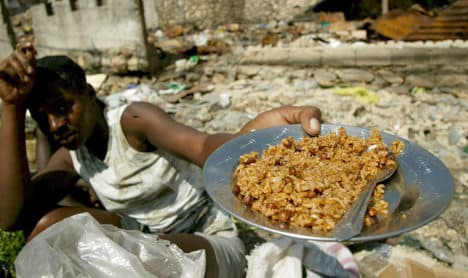Deutsche Bank's 'hunger trade' in spotlight again

The United Nations head of nutrition has criticised Deutsche Bank for pushing up food prices by speculative trading. His scolding comes months after the bank promised to reduce commodity betting, acknowledging that it increased prices.
“The role of investments banks like the Deutsche Bank has strongly increased. The price of foods is increasingly dictated by financial bodies,” said Olivier de Schutter, UN special rapporteur on the right to food.
Speaking during a visit to Osnabrück University, he said, “The extreme price fluctuations in the food markets have only a little to do with supply and demand.”
Rather, hedge funds and banks understand that discrepancies between supply and demand can result in increased prices, and will bet on that being the case, de Schutter said, the Handelsblatt newspaper reported on Thursday.
“The betting on higher prices turns into a self-fulfilling prophecy,” said de Schutter.
“When the prices rise, people want to buy more, and quickly. It is an artificially-created panic,” he said.
The rapporteur said the European Union must regulate such activities. “This development concerns me very much,” he said, adding that it led to people in developing countries being pushed into the situation of not being able to afford to feed themselves.
One in seven, or 925 million, people on the planet do not get enough to eat, he said.
De Schutter also said he was frustrated with the result of the recent G20 summit, as it did not tackle the fundamental problems. "The statement that the production of food must grow by 50 to 70 percent by 2050 is a generalisation of global hunger and shows that the real problem is not being recognised," he said.
"We have to support small producers on the ground, so they can become more efficient and grow," he argued. "What use is it to poor people in developing countries if 50 percent more food is produced by 2050 if they are so poor that they cannot afford to buy it?"
The poorest countries in the world saw their food bills increase six-fold between 1992 and 2008 he said, adding that the only solution to this problem is to invest in their domestic production, to free them from imports.
"Global hunger can only be fought if the poor work, their income increases and agriculture becomes more independent and efficient," said Schutter.
The Local/hc
Comments
See Also
“The role of investments banks like the Deutsche Bank has strongly increased. The price of foods is increasingly dictated by financial bodies,” said Olivier de Schutter, UN special rapporteur on the right to food.
Speaking during a visit to Osnabrück University, he said, “The extreme price fluctuations in the food markets have only a little to do with supply and demand.”
Rather, hedge funds and banks understand that discrepancies between supply and demand can result in increased prices, and will bet on that being the case, de Schutter said, the Handelsblatt newspaper reported on Thursday.
“The betting on higher prices turns into a self-fulfilling prophecy,” said de Schutter.
“When the prices rise, people want to buy more, and quickly. It is an artificially-created panic,” he said.
The rapporteur said the European Union must regulate such activities. “This development concerns me very much,” he said, adding that it led to people in developing countries being pushed into the situation of not being able to afford to feed themselves.
One in seven, or 925 million, people on the planet do not get enough to eat, he said.
De Schutter also said he was frustrated with the result of the recent G20 summit, as it did not tackle the fundamental problems. "The statement that the production of food must grow by 50 to 70 percent by 2050 is a generalisation of global hunger and shows that the real problem is not being recognised," he said.
"We have to support small producers on the ground, so they can become more efficient and grow," he argued. "What use is it to poor people in developing countries if 50 percent more food is produced by 2050 if they are so poor that they cannot afford to buy it?"
The poorest countries in the world saw their food bills increase six-fold between 1992 and 2008 he said, adding that the only solution to this problem is to invest in their domestic production, to free them from imports.
"Global hunger can only be fought if the poor work, their income increases and agriculture becomes more independent and efficient," said Schutter.
The Local/hc
Join the conversation in our comments section below. Share your own views and experience and if you have a question or suggestion for our journalists then email us at [email protected].
Please keep comments civil, constructive and on topic – and make sure to read our terms of use before getting involved.
Please log in here to leave a comment.